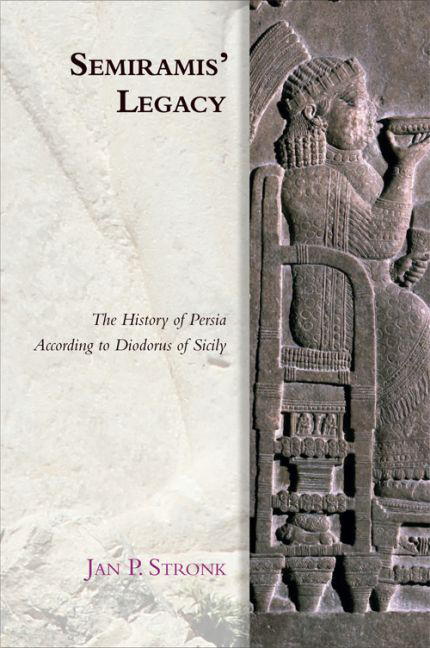Book contents
- Frontmatter
- Contents
- List of Figures and Tables
- Preface
- Abbreviations
- Series Editor's Preface
- Map
- Introduction: Diodorus' Work and Our Sources
- 1 Diodorus’ Sources
- 2 Ancient History: Assyrians, Chaldeans, and Medes
- 3 The Persians and the Greek Wars
- 4 Revolt and Sedition
- 5 Alexander the Great Defeats Darius III
- 6 From Persepolis to Babylon
- 7 The Period of the Diadochs: The Rift Opens
- 8 The Period of the Diadochs: The Rift Deepens
- 9 The Vicissitudes of the Diadoch Kingdoms: The Final Years of Diodorus' Persian Account
- 10 Semiramis' Legacy
- Conclusion
- Bibliography
- Index of Classical Sources
- Index of Modern Authors
- General Index
9 - The Vicissitudes of the Diadoch Kingdoms: The Final Years of Diodorus' Persian Account
Published online by Cambridge University Press: 10 May 2017
- Frontmatter
- Contents
- List of Figures and Tables
- Preface
- Abbreviations
- Series Editor's Preface
- Map
- Introduction: Diodorus' Work and Our Sources
- 1 Diodorus’ Sources
- 2 Ancient History: Assyrians, Chaldeans, and Medes
- 3 The Persians and the Greek Wars
- 4 Revolt and Sedition
- 5 Alexander the Great Defeats Darius III
- 6 From Persepolis to Babylon
- 7 The Period of the Diadochs: The Rift Opens
- 8 The Period of the Diadochs: The Rift Deepens
- 9 The Vicissitudes of the Diadoch Kingdoms: The Final Years of Diodorus' Persian Account
- 10 Semiramis' Legacy
- Conclusion
- Bibliography
- Index of Classical Sources
- Index of Modern Authors
- General Index
Summary
THE YEARS 311/ 10–280/ 79
[[By this time there were four main actors in the former empire of Alexander: Cassander, ruler of Macedon; Ptolemy I Soter Lagides, ruler of Egypt, the Cyrenaica, Cyprus, and parts of Cilicia; Antigonus Monophthalmus, ruler of the larger part of Phoenicia, Syria, and Anatolia; and Seleucus, ruler of the rest of Alexander's former empire, though the formal ruler of the whole empire still was Alexander IV (with his custodian, Roxane). For the history of Persia especially the confrontation between Antigonus and Seleucus became increasingly important.]]
S. 144:
19.105.1–4:
Reshuffling power; Roxane and her son are murdered:
(19.105.1) When Simonides was archon in Athens [311/10], the Romans elected to the consulship Marcus Valerius and Publius Decius. While these held office, Cassander, Ptolemy, and Lysimachus [he ruled Thrace] came to terms with Antigonus and made a treaty. In this it was provided that Cassander would be commander of Europe until Alexander, the son of Roxane, should come of age; that Lysimachus would rule Thrace; Ptolemy Egypt and the cities adjacent thereto in Libya and Arabia; that Antigonus would command all Asia; and that the Greeks would be autonomous. They did not, however, stick to these agreements, but each of them, putting forward plausible excuses, kept seeking to increase his own power. Seeing that Alexander, the son of Roxane, was growing up and that word was being spread throughout Macedonia by certain men that it was fitting to release the boy from custody and give him his father's kingdom, Cassander, fearing for himself, instructed Glaucias, who was in command of the guard over the child, to murder Roxane and the king and conceal their bodies, but to disclose to no one of the others what had been done. After Glaucias had carried out the instructions, Cassander, Lysimachus, and Ptolemy, and Antigonus as well, were freed of their anticipated danger from the king. Because there was no longer anyone to inherit the realm for the future, each of those who had rule over nations or cities entertained hopes of royal power and held the territory that had been placed under his authority as if it were a kingdom won by the spear. This was the situation in Asia, Greece, and Macedonia.
- Type
- Chapter
- Information
- Semiramis' LegacyThe History of Persia According to Diodorus of Sicily, pp. 473 - 524Publisher: Edinburgh University PressPrint publication year: 2017



